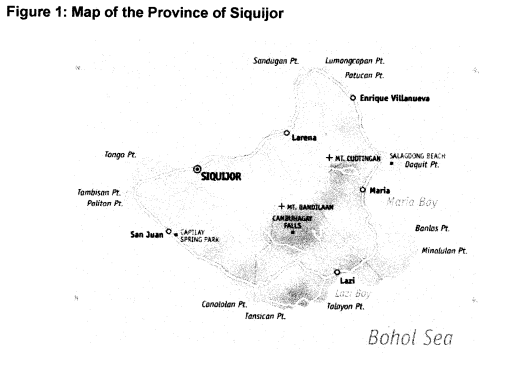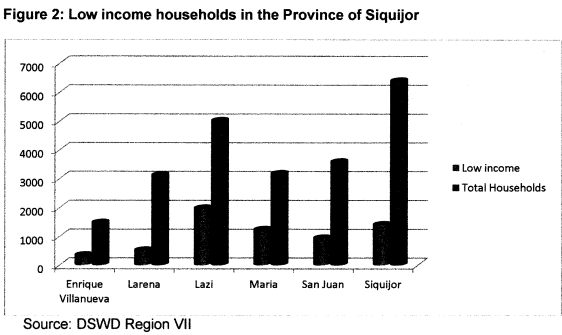Having a good ID system is necessary for achieving sustainable development. Providing a legal identity for all is one of the objectives under Sustainable Development Goals (SDG No. 16), which is to “promote peaceful and inclusive societies for sustainable development, provide access to justice for all and build effective, accountable, and inclusive institutions at all levels.”
Hence, the Philippine Identification System (PhilSys) was established. The identification called PhilID is a non-transferrable foundational identity card that shall be issued to citizens and resident aliens living in the Philippines.
To jump start this operation, the Philippine Statistics Authority-Siquijor Provincial Statistical Office is incessantly coordinating with the local government units of the Province of Siquijor in preparation for PhilSys, which is set to start in 2021. While other provinces will kick off the PhilSys pre-registration this October 2020, Siquijor, being a non-priority province, will officially start the registration in January next year.
Figure 1: Map of the Province of Siquijor

Low Income Household Heads First
The first target registrants for the first months are the household heads of the identified low income families. For the Province of Siquijor, there are 22,737 households (based on 2015 POPCEN) of which 6,432 have been identified by the Department of Social Welfare and Development (DSWD) as low-income families based on the National Housing and Targeting Survey (2015). The household heads of these families shall be registered first when the operation kicks off next year, whereas, the rest of the total population of the province at 95,984 will be entertained once all household heads of the low income families have been registered.
Figure 2: Low income households in the Province of Siquijor

Of the six (6) municipalities, the Municipality of Lazi has recorded the highest number of low income households while the Municipality of Enrique Villanueva has the least number.
However, based on the 2018 Family Income and Expenditure Survey (FIES) of PSA, only 7.2% of total households do not meet the poverty threshold.
Low Income Households
In light of the COVID-19 pandemic, the government aims to ensure that a family member of the low income families will receive the government’s assistance digitally. The PhilSys Identification Card would be a sufficient proof of their identity that will enable the person to open a bank account hassle-free.
LGU Coordination
In order to fast track the registration, PSA has partnered with the local government units (LGUs) to identify these low income household heads. While the
PSA shall lead the overall process of the registration, the LGU shall then provide the registration centers, security and crowd control personnel, and transportation of registrants in remote barangays.
As of September 2020, the PCT has acquired the list of 4Ps, Unconditional Cash Transfer (UCT), and Social Amelioration Program beneficiaries from the municipalities of San Juan and Lazi. The Municipality of Enrique Villanueva has provided the list of 4Ps beneficiaries.
Registration Procedures
InJanuary 2021, the registration will officially start, starting off with the household heads of the low-income families. Prior to the registration, the demographic data of the registrant shall be recorded by the registration team. The following information shall be collected.
A. Demographic data
a. Full name
b. Sex
c. Date of birth
d. Place of birth
e. Blood type
f. Address
g. Filipino or resident alien
h. Marital status (optional)
i. Mobile number (optional)
j. E-mail address (optional)
Demographic data shall be at all times consistent with the supporting documents presented during registration. Supporting documents includes birth certificate, passport, UMID, or any equivalent document that may support the registrant’s identity.
After the pre-registration procedure, the applicant’s biometric information will then be collected.
Biometric Information
Front-facing photograph
Full set of fingerprints
Iris scan
All information collected is enrolled in the PhilSys registry and shall be classified in a manner that allows safeguards for data privacy and security, access controls, and change management in accordance with the Data Privacy Act of 2012.
Technical Notes
Republic Act No. 11055, otherwise known as the Philippine Identification System Act, aims to establish a single national identification system for all citizens and resident aliens of the Republic of the Philippines. This was signed into law on August 2018 by President Rodrigo Roa Duterte. This I.D. shall serve as a valid proof of identity as a means of simplifying public and private transactions and shall be an economic and social platform that promotes seamless social delivery for both public and private services.
The PhilSys project emphasizes inclusive coverage, enabling access to the most vulnerable groups such as the poor people living in geographically isolated and disadvantage areas, indigenous peoples, and persons with disabilities. Specifically, it aims to (1) make services more accessible, (2) promote ease of doing business, (3) enhance the integrity of services and reduce fraud, (4) enable and promote participation and trust in digital government and the digital economy, and (5) empower Filipinos with greater control over their personal data.
Concept/s and Definition:
Mobile Registration Center – is a transportable registration center set up inside or outside the premises of PSA or other partner agencies to conduct registration services for a temporary period of time less than twelve (12) months
Personal Information – refers to any information whether recorded in a material form or not, from which the identity of an individual is apparent or can be reasonably and directly ascertained by the entity holding the information, or when put together with other information would directly and certainly identify an individual
Partner Agency – a government agency that is mandated by RA 11055 to act as a registration center for PhilSys and other institutions designated by PSA
Pre-registration – refers to the process where the applicant fills out the PhilSys Registration Form through the PhilSys web portal and selects his/her preferred registration date and PhilSys Registration Center through appointment system. This process shall generate the accomplished PhilSys Registration Form with a transaction number and barcode which must be printed and presented to the screener together with his/her supporting documents to continue with the registration process
Registration Center – refers to the necessary facilities to capture both demographic and biometric information, required for PhilSys as provided in Section 8 (A) of the IRR. PhilSys related services such as data updates and changes, credential distribution and grievance redressal shall also be made available
Resident Alien– refers to an individual who is not a citizen of the Philippines but has the appropriate immigrant visa or established residence in the Philippines for an aggregate period of more than one hundred eighty (180) days
(SGD.) AURELIA M. CANDA
Chief Statistical Specialist

